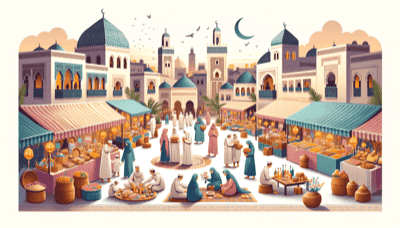We're here to help you keep count of the days to or since a date. Just click the button below and enter your chosen date to get started. Also choose the suggested days or search for a special day above #countingthedays

Eid al-Adha, also known as the Festival of Sacrifice, is one of the most significant Islamic holidays celebrated in Morocco. It commemorates the willingness of Ibrahim (Abraham) to sacrifice his son as an act of obedience to God's command. However, before he could carry out the act, God provided a ram to sacrifice instead.
The holiday falls on the 10th day of Dhu al-Hijjah, the last month of the Islamic lunar calendar. The date varies each year due to differences between the lunar and solar calendars.
Preparations: Prior to Eid al-Adha, families in Morocco purchase a sheep or goat for the sacrifice. The animal must meet specific age and health standards to be considered suitable for sacrifice.
Religious Rituals: On the morning of Eid, Moroccan Muslims dress in their finest clothing and attend special prayers at mosques or open-air prayer grounds.
Sacrifice: After prayers, a ritual animal sacrifice takes place. The act symbolizes Ibrahim's devotion and is a reminder of human submission to divine will.
Sharing Meat: The meat from sacrificed animals is divided into three parts: one-third is given away to relatives and neighbors, another third is distributed to the poor and needy, and the final third is kept for one's own family consumption.
Feasting: Families gather for festive meals featuring dishes made from the sacrificed animal such as "Mrouzia" (a sweet lamb tagine with raisins), "Kabab" (grilled meat), and other traditional Moroccan delicacies.
Charity: Beyond sharing meat with family and neighbors, acts of charity are highly emphasized during this time; many Moroccans donate money or offer assistance to those less fortunate.
Social Gatherings: It is customary for families and friends to visit each other’s homes during Eid al-Adha. Such visits are marked by warmth, hospitality, and mutual well-wishing.
Eid al-Adha serves as a period for reflection on personal sacrifices made for faith and community. It also reinforces social bonds through shared rituals and acts of charity while celebrating faithfulness and devotion within Moroccan culture.